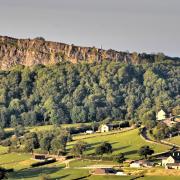A recent funding round by The Prince’s Countryside Fund announced a grant renewal for The Farming Life Centre at Blackwell, Pat Ashworth pays this valued resource a visit to find out more...

Driving through the Peak District on a beautiful spring day lifts the heart. Everything looks good and breathes contentment, from the sheep roaming the moorlands to the cattle turned out to pasture after the long, wet winter. It lends a kind of romance to farming, envy, even: how lovely to live and work here amid so much beauty.

And Derbyshire’s upland farmers generally wouldn’t change a way of life that they’ve grown up with and which their families have practised for generations. Sarah Helliwell, a National Trust tenant farmer with 900 acres in Edale, admits, ‘It’s a hard slog. I could moan for England about it but I wouldn’t really change anything about it. It’s hard graft but rewarding.’
But with the average net farm income for an upland farm currently at £6,000 to £8,000 a year, it’s a far from easy way to make a living. And farming in a National Park has both advantages and disadvantages: there’s the opportunity to explore tourist potential, if desired, but the need to balance conservation with productivity brings its own restrictions.
In any conversation about farming in the Peak, it isn’t long before the devastating foot-and-mouth epidemic of 2001 crops up. It was one of the triggers for the founding of the Farming Life Centre at Blackwell, between Buxton and Bakewell, set up in 2004 to improve the quality of life of Peak District farmers and rural communities.
A group of professionals from bodies that included the Primary Care Trust and the Rural Community Council had taken a passionate interest in promoting health in the farming community in those difficult days. A pivotal study conducted by a public health nurse consultant, Linda Syson-Nibbs and Dr Phil Cox, which compared the health of 248 primary farmers with 150 non-farming patients at Tideswell surgery, highlighted a raft of physical and mental health inequalities that farmers experienced compared with other rural residents, and explored the wider determinants of health including income, housing, education and community life.
With Bakewell market closed to stock sales during the foot-and-mouth epidemic, Linda and colleagues at the Community Council organised facilitated reminiscence sessions for older farmers who were lost without the social interaction they had always had on market day. ‘They felt their way of life was under threat, but here was a place they could come and be understood a bit,’ says Julia Cook, manager since 2007 of the Farming Life Centre. ‘So the idea came of a place where this could happen on a regular basis, that farmers could identify with, not just to talk about the old days but something that would generally bolster farmers in Derbyshire.’
A site was identified on Bill Gregory’s Blackwell Hall Farm, where a Rural Enterprise Scheme grant largely funded the renovation of the redundant Old Stable Block. The Centre opened in 2005. The first thing I notice on arrival in the kitchen is how like a farmhouse kitchen it feels, right down to the peg rug and the stone hot water bottle on the hearth, not to mention the cat curled up on a chair. The recreated 1950s feel is deliberate, the various artefacts around the room a prompt for conversation that enables older people to feel at home as soon as they step through the door.
The average age of a farmer is 57. Many are in their late seventies, some older and still running the farm on their own, in a climate where a great deal has changed in the last ten years, much of it triggered by increased regulation and the need to document every animal for traceability purposes. A massive increase in paperwork has left many farmers reeling. The Centre’s Farm Business Development Officer, Jonathan Charlesworth, explains, ‘When many of them started farming, there was no such thing as ear tags and cattle passports. Every calf born now has to have a passport, which goes with it wherever it’s transferred. Each has to be entered on a computer system – it can be done over the telephone, but that’s being phased out.
‘Pigs have to be recorded online and sheep are moving that way too. All sheep have to be tagged with electronic tags that can be read by a digital reader in a market or slaughterhouse. There’s a lot of new technology coming in and some farmers do struggle with it.’
A farmer himself, from a 60-acre mixed family farm at Penistone in South Yorkshire, he runs computer sessions at the Centre and elsewhere, including how to apply online for the annual single farm payment grant – ‘They can lose 10 per cent of subsidy funding if they don’t get it done’ – and is also working to support farmers coming into the industry or looking to diversify. Farmers already have to be everything from accountants to mechanics, he points out: if a gate comes off or a tractor fails, it’s a question of getting the tools out rather than summoning faraway help. Paperwork is the added burden.
Isolation is a big problem in hill farming in particular. Many farmers work on their own seven days a week, seeing only family, and opportunities for rest and relaxation can be few and far between. The Centre, with the ongoing support of health professionals, is trying to encourage farmers to realise that they themselves are the most important element of the farm. ‘We do encourage them to take better care of themselves. They are a stoic and very resilient community and often something has to get to crisis point before they will seek help,’ says Julia Cook. ‘Articulating your problems is half the battle.’
So projects to improve health include the weekly nurse-led clinic set up in the stock sales area at Bakewell Market, still in place 10 years on. Last year the Centre published a special Derbyshire edition of the award-winning guide ‘Fit for Farming’ – a Haynes Manual-style booklet sprinkled with cartoons and subtitled ‘A Men’s Health Workshop Manual’. Health and wellbeing projects are run by the Health Trainer, Carol Lloyd, a former policy adviser for the National Farmers Union (NFU) and a qualified carer, whose work out and about in the farming community includes one-to-one support and a regular Walking for Health group.
She also has a special interest in ageing and dementia, and her work at the Centre includes the very popular, farmer-centred reminiscence sessions. Handling and identifying fascinating artefacts such as old tools, cow chains, butter pats and recipe books evokes memories and conversation. ‘The Centre is nothing like the generic environment of a more clinical setting,’ she observes. ‘It’s a homely place where you meet people who talk about the same things as you. Some of our visitors are in the early stages of dementia and it’s a privilege to hear them recounting stories of their younger days and their working lives.’
A couple of attendees come from residential homes where many of their companions have no experience of the farming way of life. ‘They come here and talk non-stop about farming for two hours,’ Julia Cook says with pleasure. ‘That group is particularly dear to our hearts.’
The Buxton branch of Derbyshire Young Farmers meets here once a week. So does a rural crafts group of around 16 women, still meeting 10 years on, an art group and a retired farmers’ social group with weekly speakers and activities and a monthly lunch. But it’s never all about the retired. Upstairs today in the whitewashed and up-to-date large meeting room, a group of dairy farmers who supply the Cropwell Bishop cheese-making enterprise are meeting in forum with a speaker from the dairy, in a four-hour session punctuated by coffee and lunch.
I meet some of the Trustees, including Sarah Helliwell and the chair, Alison Rickett. She is also the national project manager for Fresh Start, an initiative to support the next generation of farmers and new entrants into farming, who was to be facilitating the final workshop session of the Peak District Uplands Academy, a group of 20, that evening. A farmer’s daughter herself, brought up on a mixed farm in Saffron Walden and now living in the Peak, she says the whole array of what was on offer at the Farming Life Centre drew her to accept the invitation to become a trustee. ‘There have been times in our lives when we have needed help. Anything I can do to give back, I’d like to,’ she says. ‘It’s been great to meet people locally and in the farming community.’
Jonathan Charlesworth’s work at the centre is also very much directed at the next generation and on planning for the future. ‘Many farms don’t sort out succession because it’s difficult to plan for the future,’ he says. ‘Succession in farming is very different from other businesses – the farm tends to be your home as well as your workplace and you can have three generations all living and working close together. You can end up with families falling out over it. Sometimes it’s helpful to have someone neutral like me to come in and help to get the conversation started.
‘Those looking to enter farming for the first time face difficulties in an industry that is asset-rich but cash-poor,’ he says, and in particular where many smaller, starter farms have been sold off.
His job has been funded since 2012 by the Prince’s Countryside Trust, which has renewed his grant for a further two years, to 2016 – a confirmation of the importance of the work which has delighted everyone at the Centre. ‘It would be nice to think that Jonathan could, with this new grant, provide more business development support and help farmers look to the future, rather than focusing on helping them to survive,’ Julia says enthusiastically. ‘This past few years we’ve had a run of bad summers and winters, and the weather coupled with the economy has definitely had an impact on the prosperity of the farming community.’
As for the future of the Centre, repeat longer term funding such as that from the Prince’s Countryside Fund in invaluable. ‘Here, with small pots of funding coming from a variety of sources for short term projects, it’s an uncertain way of operating. You do have to be quite flexible and responsive to what becomes available – and we find we’re crossing our fingers a lot. It’s difficult to plan for more than 12 to 18 months ahead. But we’ll find the opportunities. That’s the challenge for us, and we’re all working at it.’
Farming Life Centre, Blackwell Hall, Blackwell, Buxton, Derbyshire SK17 9TQ Tel:01298 85162 www.thefarminglifecentre.org.uk



























